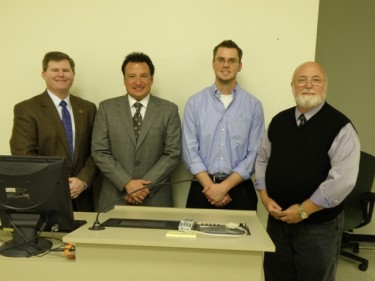By Doug Carroll
GCU News Bureau
The fifth annual Honors Societies Research Colloquium, held Tuesday afternoon in Williams lecture hall, brought together six speakers to share a wide range of research — from lung-cancer cell migration to public transportation projects to church leadership.
“The intent is to give researchers from around the University an opportunity to present what they’re doing and get feedback,” said Dr. Kevin McClean of the Ken Blanchard College of Business, who oversees the colloquium.
Here’s a summary of the speakers, their topics and what they had to say:
DR. DANIEL SMITH
About him: Joined GCU in 2005 as adjunct professor, teaching on campus and online. M.B.A. and Ph.D. from Arizona State University. Interest in research methodology in College of Doctoral Studies at GCU.
Topic: “Critical Skill Development of Doctoral Learners”
Summary: Using 11 areas of assessment for 62 doctoral learners, research quantitatively tracked how those learners were progressing, identifying roadblocks and resources.
Quote: “One of the interesting aspects of our (doctoral) program is that we can customize the feedback (to learners).”
BRIAN GAHAN
About him: Has worked in technology for 16 years, currently for K12 Inc. Also has worked for Apple, Hewlett Packard and Dell. Adjunct faculty member for two years at GCU. M.B.A. from University of Phoenix.
Topic: “The Relationship of Emotional Intelligence and Individual Performance in an Inbound North American Call Center”
Summary: Studied 20 employees in a business call center, ranging in age from 23 to 42. Characteristics of emotional intelligence were identified as intrapersonal and interpersonal skills, stress management, adaptability and mood. Found a positive correlation between age and EI in the 30-to-40 age group.
Quote: Despite his study’s limitation of sample size, “companies (should) still consider using EI as an assessment tool.”
TIM ANDERSON
About him: Has worked in information technology for more than 30 years and taught online for more than 11. Founder of Millennium III Educational Solutions, which designs educational software. M.B.A. from University of Phoenix.
Topic: “The Viability of Software to Guide Learners Through the Review of Literature”
Summary: Millennium III has developed LitAssist, a software to assist doctoral learners in completing literature reviews, which often hinder completion of their work. Over the past 50 years, the attrition rate in doctoral programs is 50 percent — generally higher in the social sciences, lower in the pure sciences.
Quote: “Software can help if it’s built on sound learning theory, if it’s implemented so that faculty and learners know why they’re using it, and if faculty and administrators support it.”
TIMOTHY TAIT
About him: Assistant communication director for the Arizona Department of Transportation. M.S. in Leadership from GCU. Will receive doctorate from GCU in May.
Topic: “Assessing Leadership Influences Within Public Involvement Programs for Transportation Projects”
Summary: Used 18-point survey to assess public perceptions of the governmental process in ADOT. Ethics, character and attitude were identified by the public and also by government staff as the most important behaviors.
Quote: “There’s been little research of the relationship between government and the community. The public thinks that when they go to a government meeting, it’s a checkmark process (by officials). They want more information and influence in the process.”
DAN HANNON
About him: B.S. in biology from GCU in 2011. Participant in Helios Scholar Program at Translational Genomics (TGen) Research Institute in Phoenix. Now working at Barrow Brain Tumor Research Center.
Topic: “A Role for Fn14 in cMet-Driven Lung Cancer Cell Migration”
Summary: The protein Fn14 can play a significant role in slowing the ability of cancer cells to migrate from the lungs to the brain.
Quote: “We’re trying to freeze time for patients and doctors, preventing cancer from exploding out of the lungs. That’s the difference between a 50 percent survival rate in five years versus 1 percent. We’re not trying to create new drugs; we’re trying to use different drugs in different ways, getting them to patient care as soon as possible.”
DR. TIM LARKIN
About him: Associate professor of sociology in GCU’s College of Arts and Sciences. Worked for 27 years with churches in urban settings, including Chicago. Ph.D. from the University of Illinois at Chicago in sociology of religion.
Topic: “The Clergy Apprenticeship Pattern in the Black Church”
Summary: Surveyed nearly 250 participants in Black Ministers Conference and conducted 60 phone interviews, finding that 84 percent of pastors were part of an apprenticeship program characterized by hands-on training, no salary and no formal curriculum. Training can take more than five years, and the average age of pastoring a first church is 35.
Quote: “It’s a fascinating process. It started in slave quarters and has continued all the way up until now. However, women do not have a lot of access to it.”
Contact Doug Carroll at 639.8011 or [email protected].




































































